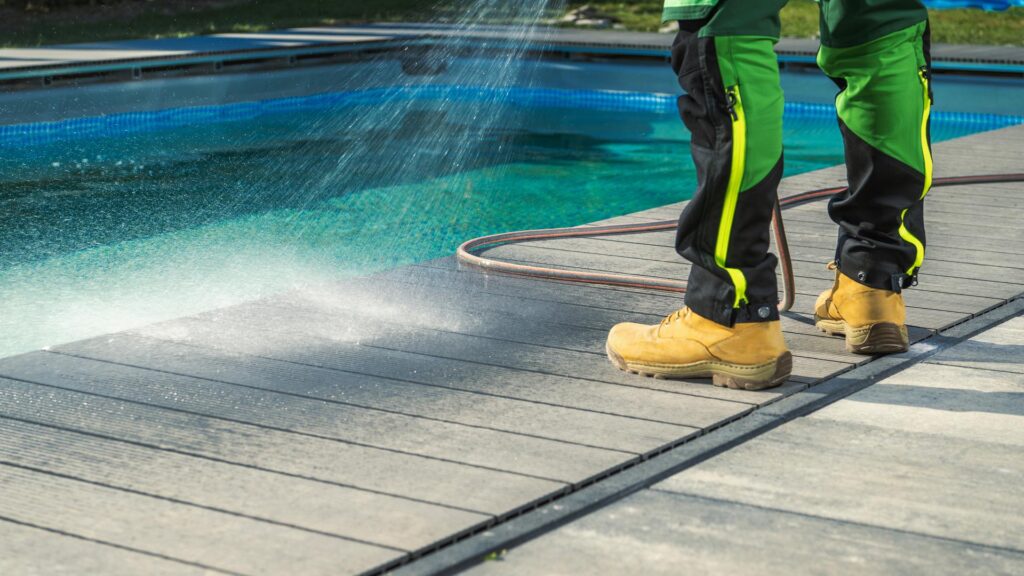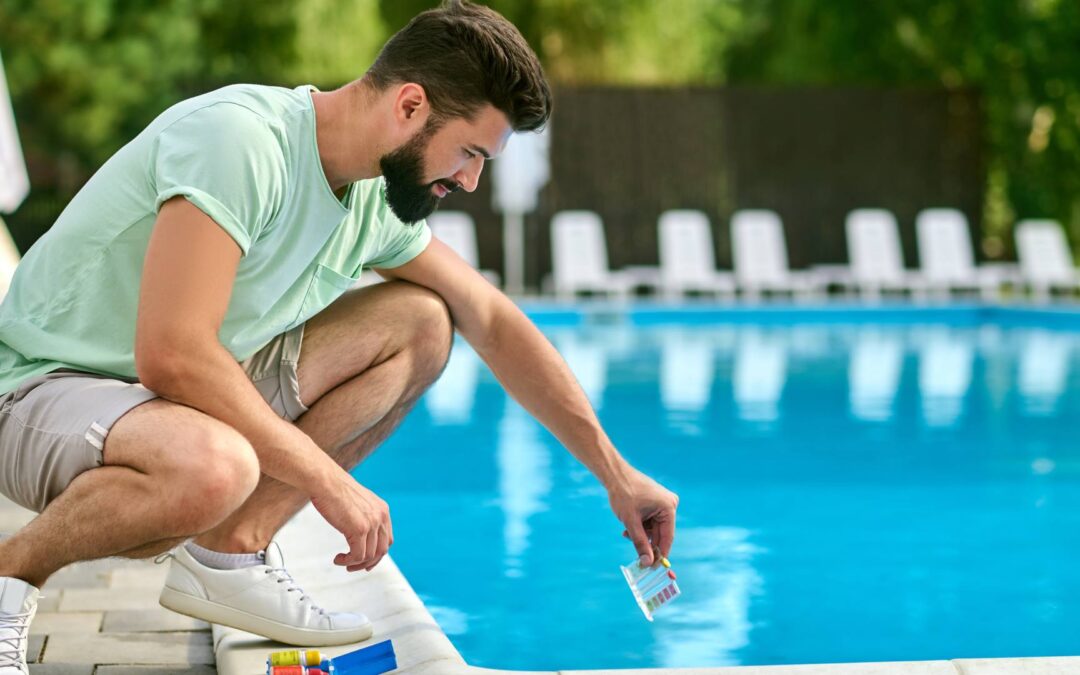Atlanta’s warm and humid climate makes owning a pool a delightful luxury for many residents. The long summers provide ample opportunity to enjoy refreshing dips, host poolside gatherings, and create lasting memories with family and friends. However, to keep your pool in pristine condition throughout the year, it’s essential to understand how Atlanta’s distinct seasons impact pool maintenance. This comprehensive guide offers detailed, Georgia-specific tips to help you care for your pool season by season, ensuring it remains a safe and inviting oasis no matter the time of year.
Understanding Atlanta’s Climate and Its Impact on Pools
Before diving into seasonal maintenance, it’s crucial to grasp how Atlanta’s climate affects your pool. The city experiences a humid subtropical climate characterized by:
- Hot, Humid Summers: Temperatures frequently soar into the 90s (°F), with high humidity levels. This environment accelerates water evaporation and promotes algae growth.
- Mild Winters: While snowfall is rare, temperatures can occasionally dip below freezing, posing risks to pool equipment if not properly winterized.
- Abundant Rainfall: Rain is common throughout the year, which can dilute pool chemicals and introduce contaminants like pollen and debris.
- Pollen Season: In spring, Atlanta experiences high pollen counts, which can affect water quality and filtration systems.
Understanding these factors is key to tailoring your pool maintenance routine to Atlanta’s specific conditions.
Spring Pool Care: Reopening and Revitalizing
As the chill of winter fades and flowers begin to bloom, spring is the ideal time to prepare your pool for the busy months ahead. Here’s how to get your pool ready for action.
Removing and Storing the Winter Cover
Begin by carefully removing your pool’s winter cover to prevent debris from falling into the water. Clean the cover thoroughly to remove dirt, mold, and mildew, then allow it to dry completely before storing it in a cool, dry place. Proper storage extends the life of your cover and ensures it’s ready for use next winter.
Inspecting the Pool and Equipment
Conduct a thorough inspection of your pool’s surfaces, looking for cracks, chips, or signs of wear in the liner or tiles. Check the condition of the pool deck and surrounding areas for safety hazards. Examine all equipment, including pumps, filters, heaters, and skimmers, ensuring they are in good working order. Replace worn-out parts and consider scheduling professional maintenance if you spot any issues.
Cleaning and Refilling the Pool
Remove any debris that may have accumulated over the winter using a leaf net or skimmer. Brush the pool walls and floor to dislodge algae and dirt. Vacuum the pool to collect the loosened debris. If the water level is low, refill the pool to the appropriate level, typically about halfway up the skimmer opening.
Balancing the Water Chemistry
Proper chemical balance is crucial for swimmer safety and equipment longevity.
- Testing the Water: Use a reliable test kit to check pH, total alkalinity, calcium hardness, and sanitizer levels.
- Adjusting pH and Alkalinity: Aim for a pH between 7.4 and 7.6 and total alkalinity between 80 and 120 ppm. These levels help chlorine work effectively and prevent equipment corrosion.
- Calcium Hardness: Maintain levels between 200 and 400 ppm to prevent scaling and etching.
- Sanitizing: Shock the pool with a high dose of chlorine to eliminate bacteria and organic contaminants that accumulated over winter.
Addressing Pollen and Allergens
Atlanta’s spring brings a surge of pollen, which can create a yellow film on your pool’s surface and clog filters.
- Skimming: Skim the surface daily to remove pollen and prevent it from sinking and staining the pool.
- Filter Maintenance: Clean or backwash filters more frequently during pollen season to maintain optimal performance.
- Enzyme Treatments: Consider using enzyme-based cleaners that break down organic matter, reducing strain on your filtration system.

Summer Pool Care: Keeping It Cool and Clean
Summer in Atlanta is synonymous with pool time. High temperatures and frequent use mean your pool requires vigilant care to stay clean and safe.
Daily Maintenance Routine
- Skimming and Scrubbing: Skim the pool daily to remove leaves, insects, and debris. Brush the walls and floor weekly to prevent algae buildup.
- Vacuuming: Vacuum the pool at least once a week to remove dirt and sediment that brushing may have missed.
- Checking Equipment: Inspect pumps and filters regularly to ensure they’re running efficiently. Clean out skimmer and pump baskets to maintain proper water flow.
Managing Water Levels and Evaporation
High temperatures increase evaporation rates, which can lower water levels and concentrate chemical levels.
- Monitoring Water Levels: Keep the water level at the midpoint of the skimmer opening to ensure effective filtration.
- Refilling as Needed: Add water when levels drop, taking care to adjust chemical balances afterward.
- Using a Solar Cover: When the pool is not in use, a solar cover can reduce evaporation and help maintain water temperature.
Balancing Chemicals in Hot Weather
Heat and sunlight can deplete chlorine levels and affect pH balance.
- Frequent Testing: Test the water 2-3 times a week during peak season.
- Maintaining Chlorine Levels: Keep chlorine between 1 and 3 ppm. Consider using stabilized chlorine to protect against UV degradation.
- pH Levels: Maintain pH between 7.4 and 7.6. High temperatures can cause pH to rise, so adjust as necessary.
- Cyanuric Acid: Use cyanuric acid as a stabilizer to protect chlorine from sunlight, keeping levels between 30 and 50 ppm.
Algae Prevention and Treatment
Warm, stagnant water is an ideal breeding ground for algae.
- Circulation: Run your pool pump for at least 8-12 hours a day to ensure proper water circulation.
- Regular Shocking: Shock the pool weekly or after heavy usage to kill any developing algae.
- Algaecides: Use preventative algaecide treatments, especially if your pool has a history of algae problems.
Swimmer Hygiene and Safety
- Showering Before Swimming: Encourage swimmers to shower before entering the pool to reduce contaminants.
- Sunscreen Use: Opt for water-resistant, biodegradable sunscreens to minimize chemical interference.
- Hydration and Breaks: Provide shaded areas and encourage regular breaks to prevent heat-related illnesses.
Fall Pool Care: Preparing for Cooler Weather
As temperatures begin to drop, it’s time to start preparing your pool for the off-season.
Managing Falling Leaves and Debris
- Leaf Net Covers: Install a leaf net over your pool to catch falling leaves, making cleanup easier.
- Skimming: Continue daily skimming to prevent leaves from sinking and causing stains or algae growth.
- Trimming Nearby Trees: Prune overhanging branches to reduce the amount of debris falling into the pool.
Adjusting Chemical Treatments
- Reducing Chlorine: With less sunlight and cooler temperatures, chlorine consumption decreases. Adjust your sanitizer levels accordingly.
- Balancing pH and Alkalinity: Continue regular testing to maintain balance and prevent corrosion or scaling.
- Enzyme Additives: Use enzymes to help break down organic materials introduced by leaves and other debris.
Equipment Maintenance
- Filter Cleaning: Clean or backwash filters to remove accumulated debris and prepare them for less frequent use.
- Pump and Heater Checks: Inspect and service pumps and heaters to ensure they’re in good condition before winter.
Partial Pool Closing
In Atlanta, fully closing a pool isn’t always necessary due to milder winters.
- Lowering Water Levels: Slightly lower the water level to accommodate winter rainfall but not so much that it affects the skimmer.
- Adjusting Pump Timers: Reduce pump run times to 4-6 hours a day as usage decreases.
- Covering the Pool: Use a solid safety cover to protect the pool while still allowing for occasional use during warm spells.
Algae Prevention
- Final Shock Treatment: Give your pool a thorough shock treatment before covering it for the season.
- Winter Algaecide: Apply a long-lasting algaecide designed to work over several months.
Winter Pool Care: Protecting Your Investment
Even though Atlanta’s winters are mild, taking steps to protect your pool during colder months ensures a smooth reopening in the spring.
Winterizing the Pool
- Thorough Cleaning: Clean the pool thoroughly to remove any debris or algae.
- Balancing Chemicals: Adjust pH, alkalinity, and calcium hardness to recommended levels to prevent corrosion or scaling.
- Adding Winter Chemicals: Use a winterizing chemical kit that includes algaecide and stain preventatives.
- Lowering Water Levels: Lower the water to below the skimmer and returns to prevent freeze damage.
Protecting Equipment
- Draining Equipment: Drain water from pumps, filters, heaters, and chlorinators to prevent freezing and cracking.
- Removing Accessories: Take out ladders, steps, and other removable equipment, cleaning and storing them properly.
- Covering Exposed Pipes: Use insulation or heat tape on exposed plumbing to guard against freezing.
Maintaining the Pool Cover
- Securing the Cover: Ensure the pool cover is tightly secured to withstand winter winds.
- Removing Debris: Regularly remove leaves, branches, and water from the cover to prevent damage.
- Checking for Damage: Inspect the cover periodically for tears or wear, repairing as necessary.
Periodic Inspections
- Water Level Checks: Monitor the water level, as heavy rains can cause overflow.
- Equipment Checks: Run the pump occasionally during warm spells to circulate water and prevent stagnation.
- Algae Monitoring: Even in winter, algae can develop. Keep an eye on water clarity and treat if necessary.
Preparing for Unexpected Freezes
- Freeze Protection Systems: Consider installing a freeze protection device that automatically turns on the pump when temperatures drop.
- Emergency Procedures: Have a plan in place to circulate water during unexpected cold snaps, such as running the pump overnight.
Year-Round Maintenance Best Practices
Consistent care throughout the year ensures your pool remains in top condition.
Regular Water Testing
- Home Testing Kits: Use reliable kits to check chemical levels weekly, adjusting as needed.
- Professional Testing: Take a water sample to a pool professional monthly for comprehensive analysis.
Equipment Upkeep
- Routine Inspections: Regularly inspect all equipment for signs of wear or damage.
- Scheduled Servicing: Have a professional service your pool equipment annually to prolong its lifespan.
Safety Measures
- Fencing and Alarms: Ensure your pool area complies with Georgia’s safety regulations, including proper fencing and gate alarms.
- Safety Equipment: Keep life rings, reaching poles, and first aid kits accessible near the pool area.
- Emergency Planning: Establish and practice safety protocols with family members and frequent guests.
Energy Efficiency and Environmental Considerations
- Variable-Speed Pumps: Upgrade to energy-efficient pumps to reduce electricity costs.
- LED Lighting: Use LED pool lights for longer-lasting, energy-saving illumination.
- Water Conservation: Fix leaks promptly and consider installing a rainwater collection system for pool top-offs.
- Eco-Friendly Chemicals: Opt for environmentally friendly cleaning products to minimize your pool’s ecological impact.
Staying Informed on Local Regulations
- Permits and Codes: Keep up-to-date with Atlanta’s building codes and permit requirements for pool renovations or installations.
- Environmental Guidelines: Follow local guidelines for chemical disposal and water drainage to protect the environment.
Expert Tips for Atlanta Pool Owners
To enhance your pool care routine, consider these expert suggestions tailored for Atlanta residents.
Embrace Smart Technology
- Automated Systems: Invest in automation for chemical feeders, pumps, and heaters to maintain optimal conditions with minimal effort.
- Remote Monitoring: Use smartphone apps to monitor and adjust pool settings remotely, receiving alerts for any issues.
Landscaping for Pool Health
- Strategic Planting: Choose trees and shrubs that are less likely to shed leaves or pollen into the pool.
- Erosion Control: Use ground covers and mulch to prevent soil erosion from contaminating your pool after heavy rains.
- Pest Management: Plant mosquito-repelling plants like citronella and lavender around the pool area.
Plan for Atlanta’s Rainfall
- Overflow Prevention: Install an overflow drain or backwash hose to manage excess water during heavy rains.
- Chemical Adjustment: After significant rainfall, test and adjust chemical levels, as rain can dilute treatments.
Consider Saltwater Systems
- Benefits: Saltwater pools offer gentler water and can be more cost-effective over time.
- Maintenance: While initial setup is more expensive, maintenance can be simpler, as the system generates chlorine as needed.
Join Local Pool Owner Communities
- Networking: Connect with other Atlanta pool owners to share tips, recommendations, and experiences.
- Education: Stay informed about local pool trends, services, and any changes in regulations.
Conclusion
Owning a pool in Atlanta is a rewarding experience that enhances your quality of life and provides endless enjoyment. By understanding the unique climate challenges and tailoring your maintenance routine accordingly, you ensure your pool remains a pristine and inviting retreat year-round. Regular care not only protects your investment but also guarantees a safe environment for all who use it.
From the first blooms of spring to the crisp air of fall, each season brings specific tasks that, when performed diligently, simplify the overall maintenance process. Embrace these seasonal strategies, stay informed about best practices, and don’t hesitate to consult with local professionals who understand the intricacies of Atlanta’s pool care needs.
With commitment and attention to detail, your pool will continue to be a source of relaxation, fun, and cherished memories for years to come.

